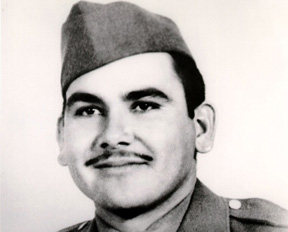
Private Felix E. Longoria from Three Rivers, Texas, was one of the soldiers who gave his life during World War II. Felix Longoria was drafted into the U.S. Army in 1944, and completed six weeks of basic training in Fort Ord, California with the 27th Infantry Regiment of the 25th Infantry Division. He was deployed to Luzon Island for his first combat assignment as an infantry man. He soon volunteered to join a patrol with orders to dislodge enemy snipers. Army Private Longoria was killed in 1945 at the age of 25 by a Japanese sniper and was awarded a Bronze Service Star, a Good Conduct Medal and a Combat Infantryman’s Badge.1 His remains were not recovered and identified until 1949 when they were returned to Three Rivers, Texas, his hometown.2
World War II, a global war, lasted from 1939 to 1945 and was the deadliest conflict in human history. The National WWII Museum reports over 500,000 Latinos (including 350,000 Mexican Americans and 53,000 Puerto Ricans) served in WWII. However, exact numbers are difficult to calculate because except for the 65th Infantry Regiment from Puerto Rico, Latinos were not segregated into their own units the way African Americans were.3 This article is not about World War II itself, instead it tells the story of one of our own Mexican American World War II Heroes from Texas. This affair shows how his community discriminated against him and his family after the war had ended despite his heroic military service for the US.
Three Rivers, Texas is a small town between Corpus Christi and San Antonio known for its hunting and fishing. In the early 1900’s, the main industries were a glass factory and a natural gas refinery. As most towns in the deep South, Three Rivers was ripe with racial segregation and discrimination. In South Texas in the 1940’s, Mexican Americans were treated as second class citizens despite many having their U.S. Citizenship. All were called Mexicans, they were turned away from local shops, swimming pools, and even banned from the barbershops. Signs were posted declaring, “No dogs, no blacks or Mexicans allowed” and “We serve whites only, no Spanish or Mexicans.”4 It was still a time when many Mexican women could only work as cleaning ladies, for Anglo families, sometimes getting paid as little as 15 cents for a day’s work. Mexicans were considered non-white despite being counted as whites on the census.5 World War II caused the nation to reexamine the laws. The Texas Legislator’s 1943 “Caucasian Race Resolution” granting Latin Americans status as “white” citizens notwithstanding.6 Thousands of Latino-American veterans returned from the war to find they were still second class citizens at home. The town of Three Rivers was no exception, Mexican Americans still lived on one side of the railroad tracks with Spanish street names and whites on the nicer side of the tracks.
Small towns were usually quick to acknowledge the death of American Heroes but not for Private Longoria’s. In mourning the death of her husband, Beatrice Longoria was to make arrangements for the wake service that she wanted to hold in their hometown. When she spoke to the Rice Funeral home, the only funeral home in town, the director, Tom Kennedy, declined to plan the service because he explained Felix Longoria was “Mexican” and because “the whites would not like it.”7 Mr. Kennedy was willing to set up a wake at the Longoria home as was the customary treatment of Mexican Americans by the Three Rivers community. Kennedy at one time was in the military, where he fought in Europe, suffered shrapnel wounds and was hospitalized until he went back to the United States. Therefore, it came as a surprise that Kennedy had no compassion for his fallen brother at arms.

Though Felix Longoria’s father had purchased a family plot on the Westside of the town where there was a fence that separated the Mexicans from the all-white burial plots, it was the service for the wake where the outrage began. All Beatrice Longoria wanted was for her husband’s service to be in his hometown with family and friends. Mr. Kennedy angered the Mexican-American community by not allowing the wake to be held at the funeral home. How was it that his ethnicity rather than his ultimate sacrifice for the country mattered more in determining whether he would received a proper burial with full honors. Hurt, confused, and in mourning, Beatrice’s sister Sarah Posas contacted Dr. Hector P. Garcia, a civil rights organizer. Dr. Garcia was no stranger to this type of discrimination so he agreed to help the Longoria family. Many time he was told, “You are not Americans, you are Mexicans” Dr. Garcia would respond by saying, “Well, we are American citizens of Mexican origin, so let’s point out to the people we are really Americans”.8 As a civil rights activist, he used his wartime skills to organize the community. He then contacted Senator Lyndon B. Johnson in Washington. Senator Johnson saw this as a national cause and took it all the way to the White House. The decision to bury Felix Longoria in a place other than Three Rivers became a collective demand for justice, dignity and equality. With collaborated work from Dr. Garcia and Senator Johnson, Felix Longoria’s remains were re-interred on February 16, 1949 in Arlington National Cemetery with full military honors.9 Dr. Garcia founded the American GI Forum in 1948 to help Military Veterans who needed assistance to receive the services and benefits they had earned as soldiers.
In 2010, Santiago Hernandez a resident from Corpus Christi gained permission from the funeral home owner to place a Texas Historical Marker on the property in memory of Felix Longoria. This came with some opposition from many white commission members, but the marker was placed. In 2014, under new management, the funeral home was demolished and converted into a parking lot. The original historical marker was allegedly hit by a driver who backed up into it and was removed. Santiago Hernandez later tried to convince the Three Rivers community to rename the local post office after Private Felix Longoria since the Texas Historical Marker had been damaged and not replaced. 10 Many community residents did not support the idea. Since the post office is a Federal building, renaming it requires a bill in the US Congress. Mr. Hernandez then contacted Congressman Lloyd Doggett who represented the Three Rivers area to inquire whether he would help change the name of the Post Office to honor Longoria. On July 22, 2004 Congressman Doggett proposed to the House of Representatives Bill 4911 that designated the United States Postal Service located in Three Rivers, Texas, as the “Private Felix Z. Longoria Veterans’ Memorial Post Office”.11

After all these years, the story about Felix Longoria, which became a catalyst for the American GI Forum and the spread of civil rights and pride among Mexican Americans is rarely spoken about in Three Rivers, Texas. Many residents still deny discrimination and segregation within the town were the motives. Talking to the townspeople many say, “This was never about race”.12 The discrimination against Felix Longoria remain unspoken when travelers from distant areas come to learn about where the Longoria Affair began. You would assume, given that a historical moment occurred in Three Rivers would be especially vigilant about anything involving the Longorias and the right for equality, but no one-including the mayor, the owner of the property who reportedly tore down the structure and members of the historical commission would speak about Felix Longoria. The Felix Longoria marker was replaced years later, it is now located on the city square in Three Rivers. 13

Some might ask why resurrect such memories and not just let the memory of Felix Longoria rest in Arlington National Cemetery alongside all other war heroes. This ghost of their past haunts the town and many would prefer to forget about it. However, communities must make amends for the many wounds inflicted by discrimination against the heroes who sacrificed their lives for the United States of America. The Historic Marker is but one small way to redress decades of open discrimination against Mexican American Veterans. This fight and ultimate victory that validates the full Citizenship rights of those born American and from Hispanic or Mexican ethnicity changed the lives of everyone in the town. Private Felix Longoria made history while alive in World War II and after his death continued to challenged discrimination in Three Rivers, Texas. While it may be a time in history some would rather not remember, the Longoria Affair sheds light, honor, and prestige forever on the Mexican American Community and the sacrifices of Gold Star families regardless of ethnicity.
- Patricia Portales, “An affair to Remember,” in San Antonio Current, august 11, 2010. ↵
- “Felix Longoria,” 1994-2011, Arlington National Cemetery, Website. www.arlingtoncemetery.net. ↵
- The National World War II Museum, Los Veteranos – Latinos in WWII, retrieve on 5/1/2020 from www.nationalww2museum.org . ↵
- Ruben Narrette Jr., “Navarette: Injustice for an American Veteran”, Press Democrat, November 10, 2010. ↵
- Ruben Narrette Jr., “Navarette: Injustice for an American Veteran”, Press Democrat, November 10, 2010. ↵
- Zachary Foust, “Caucasian Race Resolution’, July 9, 2019, Handbook of Texas Online, http://www.tshaonline.org/handbook/online/articles/mlc04. ↵
- Patricia Portales, “An affair to Remember,” in San Antonio Current, august 11, 2010. ↵
- Hector Garcia, interview, Mexican American Experience, July 9, 1969, hosted by David G. McComb, https://www.drhectorgarciafoundation.org. ↵
- Carroll, Patrick. Felix Longoria’s Wake, Publisher: The University of Texas Press, 2003. ↵
- John J. Valadez, The Longoria Affair. (2010) Boston: PB Distribution 2010. DVD. ↵
- R. 4911, July 22, 2004, 108th Congress 2 D Session. ↵
- Bob Richter, “Consider the other side of the ‘Longoria affair,'” San Antonio Express News, January 7, 2012. ↵
- Elaine Ayala, “Longoria marker to get new spot in Three Rivers,” San Antonio Express News 2015. ↵



92 comments
vvillarreal31
When thinking of WWII many people neglect to remember the fact that the majority of the army men were of color. Meaning there were numerous Latino Americans along with African Americans. This was because of the discrimination and segregation that they were out to face. Many did not receive the privilege of being buried of honors because they were not truly “American citizens”. But it just goes to show how hypocritical many Americans were due to their ideology of being able to send these troops to fight for their country while also never accepting them to be true citizens. Also the fight for these rights and recognition of these war heroes continues as we see many monuments and landmarks barely being placed for these Latino Americans.
mmartinez257
Regarding the content of the article, what I’ve read here does well to highlight just one of possibly many instances of racial discrimination as it pertains to Mexican-American war heroes. It is especial to make note of that history given those people that want us to forget it. It ought to bring no shame to a town that some of its past members were racist; merely, it should motivate us to work towards substantial behavioral amendments.
While it is a bit nitpicky, one constructive piece of feedback I can offer involves spelling and punctuation. In some lines, semi-colons should be placed where there are commas. In others, commas should be used to break sentences into better digestible pieces.
jsolis40
Wow! As someone who has lived in Texas my whole life, I had no idea who Private Felix E. Longoria was. It is so sad that he could not rest in his hometown even after he served just because he was Mexican-American. I would think he would have gained respect from the whites because he did something that not everyone could do. This article really did open my eyes to see how people treated others even though he served our country but did not even gain the respect of his people in his hometown.
Alexia Gutierrez
The signs in Three Rivers, Texas in the 1940s stating that no dogs, blacks and Mexicans allowed foreshadowed the trouble that Longoria’s wife was facing despite her husband giving his life for everyone’s freedom. Sadly, it was a long road for the Longoria family to have him commemorated in the way he deserved. How distasteful for Mr. Kennedy to not give the fallen fellow soldier the burial he had earned purely because he did not want to anger “the whites.”
It is very eye-opening how racism is still a very much alive in America, let alone Texas, while the term “United” is in the country’s name.
Jacqueline Galvan
This article does an amazing job of outlining the discriminatory past that South Texas has against its Mexican American citizens. Although the damages made to Longoria cannot be undone, it is the duty of the citizens of Three Rivers and the surrounding areas to be a voice for American heroes like Longoria and against those who still share the values of those who came before them.
Alejandra Pardo
Such a well-articulated article, I have heard of the story but never in full detail. Felix Longoria was a hero who deserves to be recognized and remembered for his sacrifice. It’s sad to hear of the discrimination his wife endured during this grief. However, she was able to receive support by reaching out to civil rights organizer Dr. Garcia, along with the assistance of assigned representative Loyd Doggett. The article shows great although sad information on how Mexican-Americans were treated and may continue to be treated in these small rural communities.
Sebastian Hernandez-Soihit
It is incredible to me that discrimination against Mexicans in the united states has such deep historical roots and that it persists today the way it does. I have spent a lot of time this semester digging into this issue at large, touching on the issues brought about by the many political movements and wars in the border region. This adds nicely to what I’ve researched so far and assures me that while Mexican Americans are still in many ways oppressed, there have been successful movements in honoring those who deserved it.
Xavier Bohorquez
This article really aligned with the other content I’ve been reading for my other classes, learning more about Latino/American History in the 1930’s/1940’s. It’s opened my eyes heavily on what our history is really made from and I’m really impressed that you included information from the U.S citizenship past.
cmartinez131
It could be quite disheartening to read about how we Latinos, whether of Mexican or Puerto Rican origin etc., can be easily swept to the side even in recent times. Yet, the reading did a great job of showing how we can triumph over these situations no matter what time we may be in. Felix Longoria did much more than serve a country that did not value him, he was a catalyst of change for many Hispanic or Latino veterans who faced the same treatment. We must hold our country accountable for all treatments we have faced because that is the only way to ensure that part of history does not get repeated. Felix Longoria is probably one of many, we must remember these men and honor them.
Emilee Luera
This reading was very opening as it described how Felix was treated by the people in his town. Although he was part of the military and fought for his town people still showed racism towards him. It shows how racism has never truly left and how we can be the generation to help change that.